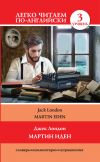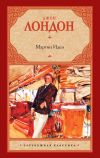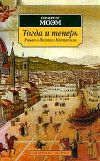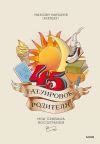Текст книги "Мартин Иден / Martin Eden (+ аудиоприложение LECTA)"

Автор книги: Джек Лондон
Жанр: Иностранные языки, Наука и Образование
Возрастные ограничения: +12
сообщить о неприемлемом содержимом
Текущая страница: 3 (всего у книги 15 страниц) [доступный отрывок для чтения: 5 страниц]
Chapter 14
“The first battle, fought and finished,” Martin said to the looking-glass ten days later. “But there will be a second battle, and a third battle, and battles to the end of time, unless – ”
He had not finished the sentence, but looked about his little room, and his eyes saw a heap of returned manuscripts, still in their long envelopes, which lay in a corner on the floor.
He sat down and regarded the table thoughtfully. There were ink stains upon it, and he suddenly discovered that he loved it very much.
“Dear old table,” he said, “I’ve spent some happy hours with you, and you are a good friend of mine.”
He dropped his arms upon the table and buried his face in them. His throat was aching, and he wanted to cry.
His knees were trembling under him, he felt faint, and he went to the bed. He looked about the room, perplexed, alarmed, wondering where he was, until he caught sight of the pile of manuscripts in the corner. He arose to his feet and confronted himself in the looking-glass.
“And so you arise from the mud, Martin Eden,” he said solemnly. “A bit of hysteria and melodrama, eh? Well, never mind. You can’t stop here. Go on. It’s to a finish, you know.”
Chapter 15
The alarm-clock drew Martin out of sleep. Though he slept soundly, he awoke instantly, like a cat, and he awoke eagerly. He hated to sleep. There was too much to do, too much of life to live.
But he did not follow his regular programme. There was no unfinished story waiting his hand, no new story demanding articulation. He had studied late, and it was nearly time for breakfast. He tried to read a chapter, but his brain was restless and he closed the book. He looked at the manuscripts in the corner. “The Pot”, “Adventure”, “Joy”.
“I can’t understand,” he murmured. “Or maybe it’s the editors who can’t understand. There’s nothing wrong with that. They publish worse every month. Everything they publish is worse – nearly everything, anyway.”
He crossed on the ferry to San Francisco and made his way to an employment office. “Any kind of work, no trade,” he told the agent; and was interrupted by a new-comer. The agent shook his head despondently.
“Nobody, eh?” said the other. “Well, I must get somebody today.”
He turned and stared at Martin, and Martin, staring back, noted the puffed and discolored face, handsome and weak.
“Looking for a job?” the other queried. “What can you do?”
“Hard labor, sailorizing, can sit on a horse, willing to do anything,” was the answer.
The other nodded.
“Sounds good to me. My name’s Dawson, Joe Dawson, and I’m trying to find a laundryman. Willing to listen?”
Martin nodded.
“This is a small laundry, belongs to Shelly Hot Springs, – hotel, you know. Two men do the work, boss and assistant. I’m the boss. You don’t work for me, but you work under me.”
Martin paused to think. The prospect was alluring. A few months of it, and he would have time to himself for study. He could work hard and study hard.
“Good food and a room to yourself,” Joe said.
That settled it. A room to himself where he could burn the midnight oil.
“But work like hell,” the other added.
Martin caressed his muscles significantly. “That came from hard work.”
“Then let’s get to it.” Joe held his hand to his head for a moment. “Look. The wages for two are a hundred dollars and board. I take usually sixty, the second man forty. But you’re green. I’ll do plenty of your work at first. Suppose you begin at thirty.”
“Not bad,” Martin announced, stretching out his hand, which the other shook. “Any advance? – for rail-road ticket and extras?”
“All I got,” was Joe’s sad answer, “is a return ticket. Come, I can buy a bottle, and maybe we’ll cook up something.”
Martin declined.
“You don’t drink?”
This time Martin nodded, and Joe lamented, “Wish I was.”
Martin arrived at Shelly Hot Springs, tired and dusty, on Sunday night. Joe greeted him exuberantly. With a wet towel, he had been at work all day.
“It’s in your room. But what is it? Book?”
Joe sat on the bed while Martin unpacked his box. Books, books, and more books.
Martin nodded, and went on arranging the books on a kitchen table.
“Gee!” Joe exploded, then waited in silence.
“Say, you don’t care for the girls – much?” he queried.
“No,” was the answer. “I used to chase a lot before I began to read the books. But since then there’s no time.”
“And there won’t be any time here. All you can do is work and sleep.”
Martin thought of his five hours’ sleep a night, and smiled.
The next morning, at quarter past six, Martin woke up for a quarter-to-seven breakfast. With them was the engineer, the gardener, and the assistant gardener, and two or three men from the stable. They ate hurriedly and gloomily, with little conversation, and as Martin ate and listened he realized how far he had travelled from them.
It was a perfectly appointed, small steam laundry, wherein the most modern machinery did everything that was possible for machinery to do. Martin, after a few instructions, sorted the great heaps of soiled clothes. Then Martin began to alternate between the dryer and the wringer. At six o’clock Joe shook his head dubiously.
“There’s much work to do,” he said. “Go to work after supper.” And after supper they worked until ten o’clock, until the last piece of clothing was ironed and folded away in the distributing room. Martin and Joe sweated and panted for air.
“Well done,” Joe said. “You are a good fellow. If you work like this, you’ll be on thirty dollars only one month. The second month you’ll get your forty. But don’t tell me you never ironed before. I know better.”
“Never ironed a rag in my life, honestly, until today,” Martin protested.
He worked for fourteen hours. He could read until then. He sat down at the table with his books. He opened a book. But he could not read it at all. He looked at the clock. It showed two. He was sleeping while sitting. He pulled off his clothes and crawled into bed, where he was asleep the moment after his head touched the pillow.
Tuesday was a day of similar toil. The speed with which Joe worked won Martin’s admiration. Joe concentrated himself upon his work and upon how to save time.
There was never an interval. Joe waited for nothing, waited on nothing, and went on from task to task.
“I don’t know anything but laundrying,” Joe said seriously.
“And you know it well.”
Martin set his alarm, drew up to the table, and opened the book. He did not finish the first paragraph. The lines blurred and ran together and his head nodded. Then he surrendered, and, scarcely conscious of what he did, got off his clothes and into bed. He slept seven hours of heavy, animal-like sleep, and awoke by the alarm.
Martin washed clothes that day, by hand, in a large barrel, with strong soft-soap.
Thursday, Joe was in a rage. A bundle of extra clothes had come in.
“I’m going to quit,” he announced. “I work here like a slave all week! This is a free country, and I’m going to tell that fat Dutchman what I think of him. And I won’t tell him in French!”
“We got to work tonight,” he said the next moment.
And Martin did not read that night, too. He had seen no daily paper all week, and, strangely to him, felt no desire to see one. He was not interested in the news. He was too tired and jaded to be interested in anything.
Chapter 16
Martin learned to do many things. It was exhausting work, hour after hour, at top speed. In the laundry the air was sizzling. There was little time to think. All Martin’s consciousness was concentrated in the work. There was no room in his brain for the universe and its mighty problems. The cool on the verandas needed clean linen.
The sweat poured from Martin. He drank enormous quantities of water, but so great was the heat of the day and of his exertions, that the water sluiced out at all his pores. He had no thoughts save for the body-destroying toil. Outside of that it was impossible to think. He did not know that he loved Ruth. She did not even exist anymore.
“This is hell, isn’t it?” Joe remarked once.
Martin nodded.
“Take a rest tomorrow,” said Joe. “You need it. I know I do.”
Joe was in a state of collapse. He was worn and haggard, and his handsome face drooped in lean exhaustion. He pulled his cigarette spiritlessly, and his voice was peculiarly dead and monotonous.
“And next week we will do it all over again,” he said sadly. “And what’s the good of it all, hey? Sometimes I wish I was a hobo. They don’t work, and they get their living. You’ll stay over for the Sunday.”
“But what can I do here all day Sunday?” Martin asked.
“Rest. You don’t know how tired you are. Why, I’m that tired Sunday I can’t even read the papers. I was sick once – typhoid. In the hospital two months and a half. Didn’t work all that time. It was beautiful.”
“It was beautiful,” he repeated dreamily, a minute later.
Martin took a bath, after which he found that Joe had disappeared. Most likely he had gone for a glass of beer. Martin lay on his bed with his shoes off, trying to make up his mind. He was too tired to feel sleepy, and he lay, scarcely thinking, in a semi-stupor of weariness, until it was time for supper. Joe did not appear for that, and when the gardener remarked that most likely he was drinking in the bar, Martin understood. He went to bed immediately afterward, and in the morning decided that he was greatly rested. Joe was still absent. The morning passed, Martin did not know how. He did not sleep, nobody disturbed him, and he did not finish the paper. He came back to it in the afternoon, after dinner, and fell asleep over it.
So passed Sunday, and Monday morning he was hard at work, sorting clothes, while Joe, with a towel around his head, was running the washer and mixing soft-soap.
“I simply can’t stop drinking,” he explained. “I must drink when Saturday night comes around.”
Another week passed, Martin’s Sunday was the same as before. He slept in the shade of the trees, and spent long hours lying on his back, doing nothing, thinking nothing. He was too dazed to think, though he was aware that he did not like himself. He had no vitality. He was dead. His soul seemed dead. He was a beast, a work-beast. He saw no beauty in the sunshine, life was intolerably dull and stupid, and its taste was bad in his mouth. He envied Joe, who was drinking and enjoying cheap wine, and not thinking about the toil.
A third week went by, and Martin loathed himself, and loathed life. There was reason for the editors to refuse his stories. He could see that clearly now, and laugh at himself and the dreams he had dreamed. Ruth returned his “Sea Lyrics” by mail. He read her letter apathetically. She did her best to say how much she liked them and that they were beautiful. But she could not lie. She knew they were failures, and he read her disapproval in every line of her letter. And she was right. Beauty and wonder had departed from him.
When Sunday came he went to the saloon.
“I thought you didn’t drink at all,” was Joe’s greeting.
Martin called for whiskey, and took the bottle.
“The work did it, eh?” Joe queried.
Martin refused to discuss the matter. He was drinking silently. A few more drinks, and he began to forget about the toil.
Joe had a dream – to have his own laundry.
“I tell yeh, Mart, there won’t be any kids in my laundry – no. And there won’t be any work after six P.M. I say! I’ll make you superintendent. Now here’s the scheme – “
But Martin turned away, leaving him to tell it to the barkeeper.
Chapter 17
On Monday morning, Joe groaned and groaned.
“I say,” he began.
“Don’t talk to me,” Martin snarled.
“I’m sorry, Joe,” he said at noon, when they went for dinner.
Tears came into the other’s eyes.
“That’s all right, old man,” he said. “We’re in hell, and we can’t help ourselves. But, you know, I like you.”
Martin shook his hand.
“Let’s quit,” Joe suggested. “Let’s go hoboing. I have never tried it, but it must be easy. And nothing to do. Just think of it, nothing to do. I was sick once, typhoid, in the hospital, and it was beautiful. I want to be sick again.”
The week dragged on. The hotel was full. They worked late each night, and even got in a half hour’s work before breakfast. Martin no longer took his cold baths.
It was only at rare moments that Martin was able to think. The house of thought was closed. He was a shadow. Joe was right. They were both shadows. Was it a dream? Saturday came, as usual.
“I’ll go down and get a glass of beer,” Joe said, in the queer, monotonous tones that marked his week-end collapse.
A fifth week passed, and a sixth, during which he lived and toiled as a machine. At the end of the seventh week, too weak to resist, Martin went down to the village with Joe and drowned life and found life until Monday morning. The drink was an effect, not a cause. The whiskey was wise. It knew secrets of life.
Martin called for paper and pencil.
“A telegram, Joe,” he said. “Read it.”
Joe read it with a drunken, quizzical leer. But what he read seemed to sober him.
“You are going to leave me, Mart?” he queried hopelessly.
Martin nodded, and called the boy to take the message to the telegraph office.
“Wait,” Joe muttered. “Let me think.”
Martin’s arm around him and supporting him, while he thought.
“Write that two laundrymen are leaving,” he said abruptly. “Here, write so.”
Martin looked at him for a moment, then cried:
“By God, I think you’re right! Better a hobo, man, than a beast of toil.”
“I was in hospital, once,” Joe remembered again. “It was beautiful. Typhoid – did I tell you?”
While Martin changed the telegram to “two laundrymen,” Joe went on:
“I never wanted to drink when I was in hospital. Funny, isn’t it? But when I work like a slave all week, I must drink. Here, let me pay half of that telegram. Come on, everybody, drink!” Joe called.
Martin was standing, ready to go. They shook hands, and Joe said:
“I’m going to see you again, Mart, before you and me die. I feel it in my bones. Good-bye, Mart, and be good. I like you, you know.”
Chapter 18
Ruth and her family were home again, and Martin, returned to Oakland, saw her very often. She gained her degree, she was doing no more studying. Martin was very tired of writing. This gave them time for each other that they had never had before.
At first, Martin had done nothing but rest. He had slept much, and spent long hours thinking and doing nothing. The first signs of reawakening came when he discovered languid interest in the daily paper. Then he began to read again – light novels, and poetry; and after several days his splendid body and health made new vitality.
Ruth showed her disappointment when he announced that he was going to sea for another voyage.
“Why do you want to do that?” she asked.
“Money,” was the answer. “For my next attack on the editors. Money is the sinews of war, in my case – money and patience.”
“But if all you wanted was money, why didn’t you stay in the laundry?”
“Because the laundry was making a beast of me. Too much work of that sort drives to drink.”
She stared at him with horror in her eyes.
“Do you mean – ?”
“Yes,” he answered. “Just that. Several times.”
She drew away from him.
“No man that I have ever known did that – ever did that.”
“Then they never worked in the laundry at Shelly Hot Springs,” he laughed bitterly. “I’m going to sea one more voyage. It will be my last, I think, for when I come back, I shall break into the magazines. I am certain of it.”
She was silent.
“Some day I shall write it – ‘The Degradation of Toil’ or the ‘Psychology of Drink in the Working-class’, or something like that for a title.”
They walked a lot, and read poetry aloud, and discussed many things, and spent time with each other – more and more.
“I can recommend my little girl to be careful,” her mother warned her one day.
“I know what you mean. But it is impossible. He – ”
Ruth was blushing.
“He is rough, brutal, strong – too strong,” her mother finished the sentence for her.
“And he frightens me. Sometimes I am in terror of him, when he talks about the things he has done.”
“But I am interested in him,” Ruth continued. “He is my protege. Then, too, he is my first boy friend – but not exactly friend; rather protege and friend combined. Sometimes, too, when he frightens me, it seems that he is a bulldog.”
Her mother waited.
“He interests me, I suppose, like the bulldog. And there is much good in him, too; but there is much in him that I would not like. He swears, he smokes, he drinks, he fights. Then he is too strong. My prince must be tall, and slender, and dark – a graceful, bewitching prince. No, there is no danger of my falling in love with Martin Eden.”
“But have you thought about him?” her mother equivocated. “He can fall in love with you?”
“But he does – already,” she cried.
“It was to be expected,” Mrs. Morse said gently.
“I am happy with Martin Eden!” Ruth exclaimed. “No one ever loved me before – no man, I mean, in that way. And I like it. You think I am dreadful, I know, but I am honest, and I tell you just how I feel.”
Mrs. Morse was strangely sad and happy. Her child-daughter, who was a bachelor of arts, was gone; but in her place was a woman-daughter. It was a holy hour for mother and daughter, and their eyes were wet as they talked on in the twilight.
“He is four years younger than you,” Mrs. Morse said. “He has no place in the world. He has neither position nor salary. He is impractical. Martin Eden, I am afraid, will never grow up. He does not take to responsibility and a man’s work in the world like your father did, or like all our friends, Mr. Butler for example. Martin Eden, I am afraid, will never be a money-earner. And in this world money is necessary for happiness.”
“You see, I do not love him.”
“I am glad of that. I do not want my daughter, who is so clean and pure, to love a man like him. There are noble men in the world who are clean and true and manly. Wait for them. You will find one some day, and you will love him and be loved by him, and you will be happy with him as your father and I have been happy with each other. And there is one thing – “
“Yes, mother.”
Mrs. Morse’s voice was low and sweet as she said, “And that is the children.”
“I – have thought about them.”
“And it is that, the children, that makes Mr. Eden impossible,” Mrs. Morse went on incisively. “Their heritage must be clean, and he is, I am afraid, not clean. Your father has told me of sailors’ lives, and – and you understand.”
Ruth pressed her mother’s hand.
“We are women together,” her mother said, drawing her to her and kissing her. “We are women together,” she repeated, as they went out of the room.
“Our little girl has become a woman,” Mrs. Morse said proudly to her husband an hour later.
“That means,” he said, after a long look at his wife, “that means she is in love.”
“No, but that she is loved,” was the answer.
“Then we’ll have to get rid of him.” Mr. Morse spoke briskly, in businesslike tones.
But his wife shook her head. “It will not be necessary. Ruth says he is going to sea in a few days. When he comes back, she will not be here. We will send her to Aunt Clara’s.”
Chapter 19
The desire to write came to Martin again. He composed the sonnet that was the first of a love-cycle of fifty sonnets which was completed within two months.
“I don’t believe you know a word of what you are reading,” she said once when he had finished reading his sonnets.
He looked at her with burning eyes.
“I don’t believe you know either. What was the last sonnet about?”
“I don’t know,” she laughed frankly. “I’ve already forgotten. Don’t let us read any more. The day is too beautiful.”
The book slipped from his hands to the ground, and they sat idly and silently. Ruth glanced at his neck. Her shoulder touched his as lightly as a butterfly touches a flower. His lips approached hers.
This must be love, she thought. It could be nothing else than love.
“When did you love me?” she whispered.
“From the first, the very first, the first moment I had seen you. I am mad, now, dear. I am almost a lunatic.”
“I am glad I am a woman, Martin – dear,” she said, after a long sigh.
He crushed her in his arms again and again, and then asked: —
“And you? When did you first know?”
“It came to me suddenly.” She was speaking very slowly. “I never knew until just now when – you put your arms around me. And I never expected to marry you, Martin, not until just now. How did it happen?”
“I don’t know,” he laughed.
“What will my relatives say?” she cried.
“I don’t know.”
“But if mamma objects? I am sure I am afraid to tell her.”
“Let me tell her,” he offered. “I think your mother does not like me, but I can win her sympathy. A fellow who can win you can win anything.”
“I am older than you,” she remarked suddenly, “three years older.”
“Hush, you are only a child, and I am forty years older than you, in experience,” was his answer.
Правообладателям!
Данное произведение размещено по согласованию с ООО "ЛитРес" (20% исходного текста). Если размещение книги нарушает чьи-либо права, то сообщите об этом.Читателям!
Оплатили, но не знаете что делать дальше?








































